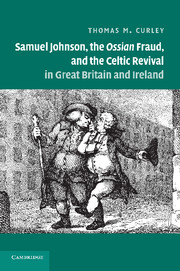Book contents
- Frontmatter
- Contents
- Prefatory acknowledgments
- 1 An introductory survey of scholarship on Ossian: why literary truth matters
- 2 James Macpherson's violation of literary truth
- 3 Johnson on truth, frauds, and folklore: in the company of Thomas Percy
- 4 Searching for truth in the Highlands: Macpherson throws down the gauntlet
- 5 Charles O'Conor and the Celtic Revival in Ireland
- 6 Johnson and the Irish: more opposition to Ossian
- 7 Johnson's last word on Ossian with William Shaw: a finale to controversy
- Appendix A A Reply to Mr. Clark's Answer
- Notes
- Bibliography
- Index
1 - An introductory survey of scholarship on Ossian: why literary truth matters
Published online by Cambridge University Press: 30 July 2009
- Frontmatter
- Contents
- Prefatory acknowledgments
- 1 An introductory survey of scholarship on Ossian: why literary truth matters
- 2 James Macpherson's violation of literary truth
- 3 Johnson on truth, frauds, and folklore: in the company of Thomas Percy
- 4 Searching for truth in the Highlands: Macpherson throws down the gauntlet
- 5 Charles O'Conor and the Celtic Revival in Ireland
- 6 Johnson and the Irish: more opposition to Ossian
- 7 Johnson's last word on Ossian with William Shaw: a finale to controversy
- Appendix A A Reply to Mr. Clark's Answer
- Notes
- Bibliography
- Index
Summary
Ossian sublimest, simplest bard of all,
Let English infidels M'Pherson call.
Charles Churchill, A Prophecy of Famine (1763)Concerning Samuel Johnson, a very close friend affirmed that “no man had a more scrupulous regard for truth; from which, I verily believe, he would not have deviated to save his life.” No writer angered Johnson more than did James Macpherson for perpetrating what arguably became the most successful literary falsehood in modern history. With the monumental exception of his Lives of the English Poets (1779–81), Johnson's most notable literary undertaking in old age after his edition of Shakespeare (1765) involved debunking Macpherson's bogus poetry. Exposing Macpherson's fabricating ways was a fitting activity for an author ranked as England's greatest moralist. This book, therefore, is fundamentally a study about Johnson and Ossian, Johnson's interest in Gaelic culture and linguistics, and his involvement in a controversy smoldering throughout the British Isles for almost the final quarter-century of his life. The present chapter briefly reviews the enormous amount of scholarship published about Macpherson since 1800. The subsequent focus of attention lies on much of the pre-1800 critical response by Scottish, English, and Irish participants in a Celtic Revival, which unleashed national cultural wars over historical origins and political precedence for an ethnically mixed people. The contest over the authenticity of Macpherson's pseudo-Gaelic productions became a seismograph of the fragile unity within restive diversity of imperial Great Britain in the age of Johnson.
- Type
- Chapter
- Information
- Publisher: Cambridge University PressPrint publication year: 2009



